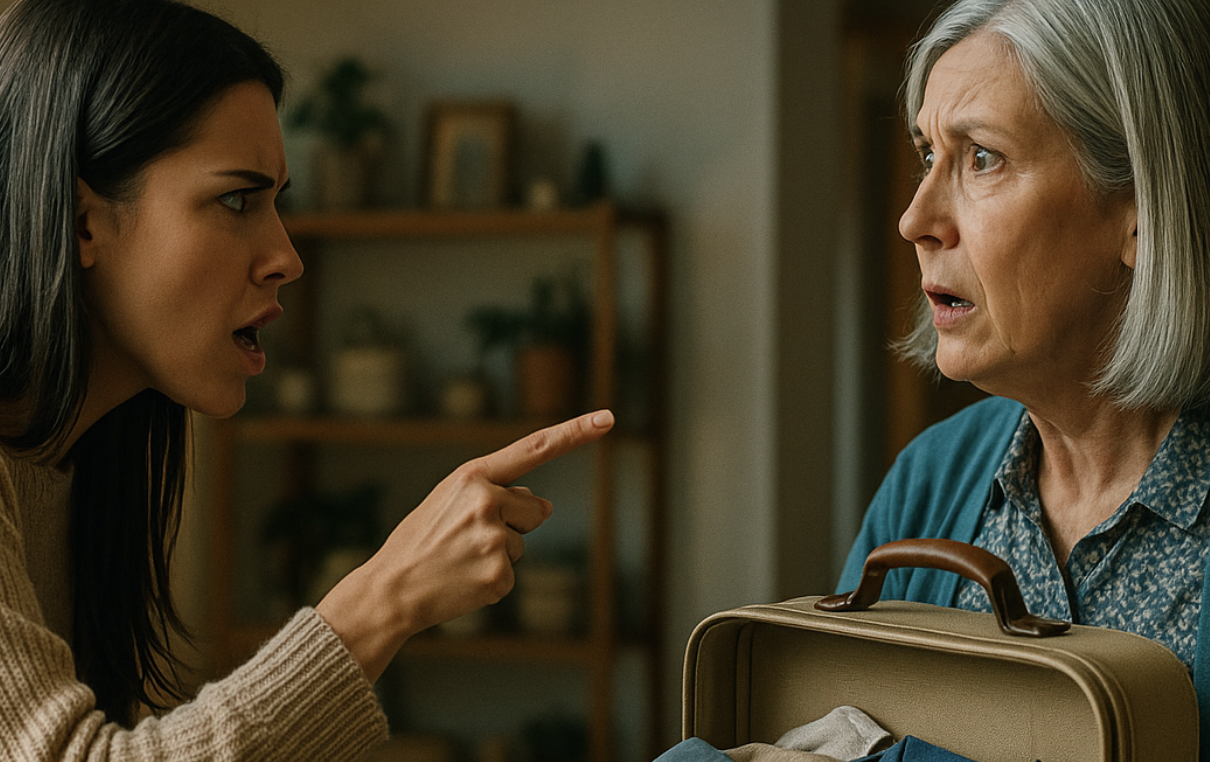Polina studied the new curtains with a careful eye. Powder-blue, sprinkled with tiny flowers—exactly what she’d pictured for the living room. She fussed with the pleats, stepped back a few paces, and allowed herself a small, satisfied smile.
“Sergey, what do you think?” she called to her husband, who was slouched in the armchair, face lit by his phone.
“It’s fine,” he muttered, not looking up.
“Maybe a larger print would’ve been better?” Polina wavered.
He finally lifted his gaze, flicked it toward the window, and shrugged.
“What’s the difference? Curtains are curtains.”
Polina exhaled. Lately, Sergey had felt far away, as if carrying some invisible burden. She sat on the edge of the sofa and touched his hand.
“Did something happen? You’ve been different.”
He hesitated, set his phone down, rubbed the bridge of his nose.
“Polina, we need to talk.” His tone was unexpectedly grave. “Mom retires next week.”
“And?” Polina’s eyebrow arched.
“And she won’t do well alone. She’s used to people, to bustle. Four walls will drive her crazy.”
Polina stiffened; she could see where this was going.
“I was thinking,” Sergey went on, “maybe she could stay with us for a while—just until she adjusts.”
Polina’s fingers curled into her palm. Sergey’s mother, Larisa Arkadyevna, had never warmed to her. Every visit had come with a critique: Polina was too thin, her clothes were wrong, the apartment wasn’t kept properly.
“For how long?” she asked, steady.
“A month, two at most.” He spread his hands. “Until autumn.”
“All right,” Polina said after a beat. “But only for a short time.”
“You’re the best!” Sergey sprang up and hugged her. “Mom will appreciate this.”
A week later, the door swung open and in swept Larisa Arkadyevna with two oversized suitcases.
“I assume you prepared a room,” she announced, giving the hall a critical once-over.
“Of course, Mom. The guest room is yours,” Sergey said, whisking the luggage away.
Polina managed a tight smile. “Come in, Larisa Arkadyevna. Tea?”
“Yes. No sugar.” The older woman brushed past her. “And take down those horrible floral rags on the window. They make my eyes ache.”
Polina bit her lip. Just a couple of months, she reminded herself.
Only the “couple of months” stretched into six. Larisa settled in, lined the kitchen shelves with jars of jam and pickles, rearranged the living room art, and tossed Polina’s favorite throw pillows—“dust traps,” she called them.
“Sergey, I can’t keep doing this,” Polina whispered late one night. “Your mother acts like this is her apartment.”
“She’s always been the housekeeper type,” Sergey sighed. “It’s hard for her now. Transitional period. A crisis.”
“What crisis at sixty?” Polina threw up her hands. “She threw out my porcelain figurine collection yesterday!”
“She didn’t throw them out—she boxed them up. They were cluttering things.”
“In my apartment.”
“In our apartment,” Sergey corrected gently.
“The apartment I bought before we married—with the money from selling my grandmother’s place,” Polina said.
Sergey’s mouth tightened. “Let’s not go there. Just a little more patience.”
Polina turned to the wall and shut her eyes. Conversations like this were happening more and more.
Soon the criticism became open and constant.
“You’ve over-salted it again,” Larisa sniffed, pushing away her plate of stewed potatoes. “In my day, mothers taught girls to cook.”
“In your out-of-date day, they also married girls off without asking,” Polina shot back—and immediately wished she hadn’t.
“Sergey! Did you hear her?” Larisa turned to her son. “I’m an older woman. I deserve respect.”
“Polina, don’t,” Sergey said wearily. “Mom’s right—respect your elders.”
Polina rose from the table without a word and went to the bedroom. The hurt sat in her chest like a stone. It wasn’t only her mother-in-law turning her into a stranger in her own home—it was her husband’s silence.
The next morning, dressing for work, Polina discovered her favorite blouse missing.
“Larisa Arkadyevna, have you seen my white blouse?” she asked, peeking into the kitchen.
“That tasteless thing? I washed it. You wash wrong; that’s why it looks like a rag.”
“I was going to wear it today,” Polina said, fists tightening.
“Buy yourself something decent,” the older woman sniffed. “At your age, dress like a woman, not a teenager.”
Polina inhaled, ready to answer—just as Sergey walked in.
“What’s happening?”
“Your mother took my things without asking!” Polina burst out.
“I’m helping her look presentable,” Larisa countered crisply. “Sergey, tell her it’s improper for a married woman to wear such revealing stuff.”
“A white blouse is revealing?” Polina stared.
Sergey raised his hands. “Let’s not fight over a blouse. Polina, wear something else. Mom, please ask before taking her things.”
Polina arrived late to work and dragged herself through the day. She dreaded going home. The apartment had become foreign territory—every step met with commentary. That evening she met her friend Natasha at a café.
“I can’t do this anymore,” Polina confessed, circling a spoon through her now-cold tea. “She’s made my life hell.”
“And Sergey?” Natasha asked.
“Always on his mother’s side.” Polina’s smile was bitter. “Yesterday he said I should respect her because without her, there’d be no him and no our marriage.”
“Maybe move out for a bit?” Natasha suggested. “I have a spare room.”
“This is my apartment,” Polina said, shaking her head. “Why should I leave?”
“Then talk to him,” Natasha said gently. “Calmly. No accusations. Explain you’re not okay.”
Polina considered. Maybe one more conversation—calm, clear.
When she returned home, she found Larisa in her bedroom.
“What are you doing?” Polina stopped short.
“Clearing space in the closet,” Larisa said briskly, rifling through hangers. “I have too many clothes for the guest room. Sergey said I could take some of yours.”
That was the last straw.
“Stop,” Polina said, quiet but cold.
Larisa didn’t even look up. “You begrudge space for your husband’s mother? How selfish.”
“This is my bedroom and my closet,” Polina said, stepping closer. “Please leave.”
“Don’t order me around, girl.” Larisa straightened and looked down at her. “You may be my son’s wife, but you’ve earned no respect.”
“What’s going on?” Sergey appeared in the doorway, drawn by the voices.
“Your mother is going through my things!” Polina pointed to the clothes scattered across the bed.
“I only wanted to hang mine up, and your wife made a scene,” Larisa pursed her lips. “I always suspected she didn’t respect family values.”
Sergey sighed. “Polina, why the drama? Mom just needs a little space.”
“A little space?” Polina pressed her hands to her temples. “She has the entire guest room, half the kitchen, she’s thrown out my things, rearranged the furniture—and now she’s in our bedroom!”
“Don’t exaggerate,” Sergey said, waving her off. “Mom just wants—”
“I don’t care what your mother wants,” Polina cut in. “This is my apartment. I bought it before we married.”
“Not this again,” Sergey frowned. “How long will you keep bringing that up?”
“I’m not picking a fight,” Polina said, voice rising despite herself. “But I won’t be a guest in my own home.”
“You see, Sergey?” Larisa slipped in. “She has no respect for me or you. A proper woman doesn’t shout at her husband.”
Polina inhaled slowly, forcing herself to steady. “Sergey, let’s talk alone.”
“So you can turn him against me?” Larisa scoffed. “No. I’m staying. I have a right to know what happens in my son’s family.”
“You have no right to tell me how to live in my home,” Polina snapped. “You were a guest. A temporary guest. Now you’re acting like a warden.”
“How dare you speak to my mother like that?” Sergey flared. “Apologize.”
“Apologize?” Polina stared. “For defending my space? She was supposed to stay for two months. It’s been six.”
“So what?” Sergey crossed his arms. “She’s my mother. I won’t throw her onto the street.”
“Onto the street?” Polina let out a humorless laugh. “She owns a three-bedroom apartment.”
“She doesn’t want to live alone,” he shot back. “Have you no heart?”
“No heart?” Polina glanced at the open closet, the strewn clothes, her mother-in-law’s pinched face. “For six months I’ve listened to how I’m a poor wife, housekeeper, daughter-in-law.”
“Stop dramatizing,” Sergey said with a grimace.
“I’m not dramatizing. I’m done. Either your mother goes back to her place, or—”
“Or what?” he challenged.
Polina fell silent. She had never imagined their marriage might splinter over what began as a ‘temporary arrangement.’
“You see?” Larisa said triumphantly. “She can’t even threaten properly. Weak, spineless. She shows attitude in our house? Put her in her place.”
Something snapped inside Polina. The humiliations, the appeasing, the fear of conflict—all of it broke loose.
She straightened and met her mother-in-law’s eyes. “No, dear mother-in-law. I bought this apartment before the marriage. Pack your things. Today. I won’t let you torture me in my own home anymore.”
“What did you say?” Larisa breathed.
“You heard me. Pack and leave.”
“You can’t throw my mother out!” Sergey shouted.
“I can,” Polina said, turning to him. “And I am. This apartment is mine. I decide who lives here.”
“I’m your husband!”
“A husband who never once stood up for me,” Polina replied, her voice low. “Who watched his mother humiliate his wife and kept quiet.”
“You’re petty and cruel,” Larisa hissed. “Poor boy—such a wife.”
“You’re right—he didn’t get lucky,” Polina said evenly. “A real man wouldn’t let his mother treat his wife like this.” She walked to the door. “You have two hours. Both of you.”
“What?” Sergey stared. “You’re kicking me out too?”
“Do you want to stay,” Polina asked, “after all of this?”
He looked between his mother and his wife, mute.
“Don’t worry, son,” Larisa interjected. “We’ll go to my place. You’ll find a proper girl who respects her elders.”
Polina shook her head and left the room. Strangely, there was no pain—only relief, as if a heavy stone had been lifted.
Two days later, a knock. Sergey stood at the threshold.
“Polina, let’s talk.”
“About what?” She folded her arms. “How you let your mother degrade me? How you never once took my side?”
“I tried to keep the peace,” he said. “I failed.”
“You didn’t try,” Polina answered softly. “You took the easy path. Mom yells—so we accommodate. I stay quiet—so I must be fine.”
“I love you,” he said.
“Love isn’t just words,” she replied with a sad smile. “It’s what you do. And you chose your mother, not your wife. I accept your choice. Now accept mine.”
She closed the door and leaned against it. Tears slid down, but strength rose to meet them. Polina had reclaimed her life, her home, her dignity.
A week later, she painted the bedroom her favorite lavender, put the light-blue floral curtains back up, and bought new cushions. The apartment felt like hers again—her haven, her stronghold.
A month after that, Natasha introduced her to Andrei—calm, self-assured, the kind of man who listened, asked about her work, valued her opinion, never interrupted. And, most importantly, he had his own apartment—one that his mother did not inhabit.
Sometimes a loss is the quiet door to something better. Polina was grateful for the lesson. No one would cross her boundaries again. Not even in the name of love.



